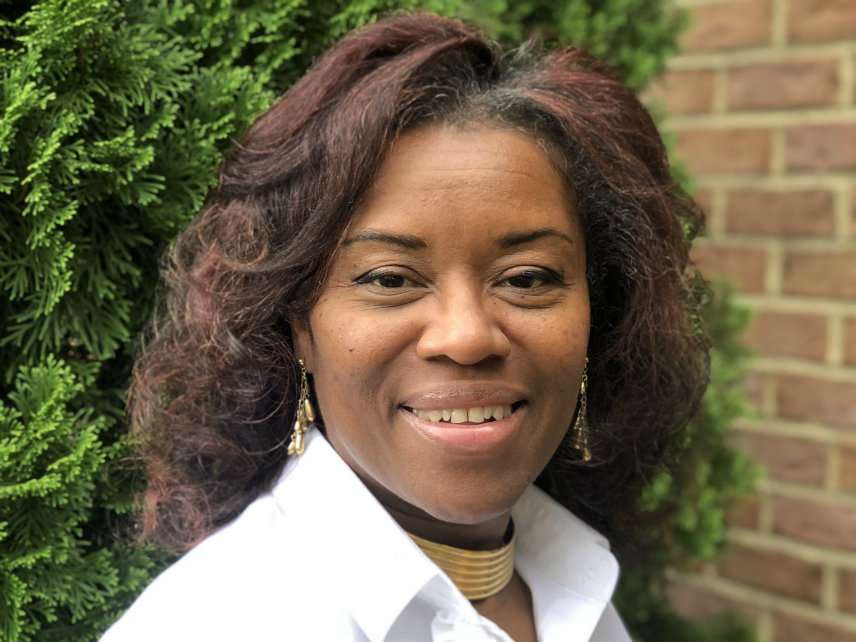Virginia Republican Announces Senate Campaign to Protest Corey Stewart
"If you surround yourself with white supremacists and Nazis, then you're telling me that you're one of them," Winsome Sears tells Reason.

Republican senatorial candidate Winsome Sears' chances of winning a U.S. Senate seat from Virginia this November are miniscule at best. But in her mind, she's "already won."
For Sears, an Marine veteran and former state delegate from 2002 to 2004, throwing her hat in the ring is a victory in and of itself. "I've entered the race. People are talking, people are thinking, the message is getting out," she tells Reason.
Less than two months from election day, Sears has officially announced her candidacy. The problem for her is that the Republicans already have a nominee. Corey Stewart, a controversial far-right politician, is challenging incumbent the Democratic incumbent, Sen. Tim Kaine. So Sears' name won't be on the ballot; instead, she's asking voters to write her in.
While Sears is challenging Kaine, the true goal of her candidacy is to "send a message" that "Stewart and people of his ilk are not the future of the Republican Party." She's particularly troubled by some of Stewart's past remarks and the people he surrounds himself with.
Stewart has spoken out in support of the Confederate flag and the Confederacy itself. He once called anti-Semitic former Wisconsin congressional candidate Paul Nehlen "one of my personal heroes," and he's appeared in public with white supremacist activist Jason Kessler, who helped organize last August's infamous "Unite the Right" rally in Charlottesville. Stewart has distanced himself from both Nehlen and Kessler, though racially charged comments from two people tied to his campaign have ensured that the controversy over his racial views lives on.
Is Stewart himself a white supremacist? Stewart says no, but Sears disagrees. "It's not what you say, it's what you do," she says. "And if you surround yourself with white supremacists and Nazis, then you're telling me that you're one of them." As a black woman born in Jamaica, she won't stand for it. "I am a black person," she says, explaining that "the Republican Party was begun for people who look like me to not be treated as subhuman."
Politicians like Stewart are not "true" Republicans, according to Sears. "They're bogarting their way into the party," she says. "We need to get this evil away from us."
It was one such politician who helped bring Sears' attention to the problem. In March, she heard about Arthur Jones, a self-described Nazi running as a Republican to represent Illinois' 3rd Congressional District. Jones was unopposed in the primary, and he'll face Rep. Dan Lipinski (D–Ill.) in the November general election.
Since Sears lives in Virginia, there wasn't much she could do about Jones. Then in June, Stewart won the GOP Senate primary in Virginia over two other candidates. Sears initially thought someone would step up to stop him. Eventually, "I realized that somebody was me," she says.
Sears hoped to have her campaign up and running around the start of September, though she was unable to do so. Now that she's finally in the race, Sears wants everyone "to understand who" Stewart really is. "And I'm finding that some people don't know."
Though Sears is an ardent conservative, she's disturbed by the current divisive political climate, which she describes as "a boxing ring" where people just "stick to our corners."
"As soon as the bell rings," she says, noting that the "bell" in her analogy is the election cycle, "we come out swinging. We can't agree to disagree. We can't be reasonable with each other. We just throw stuff and hope something sticks." When "the bell rings again because the election is over," she adds, "we go back to our corners and we simmer and we figure out how we're going to destroy the opponent the next time."
Another issue she has with the current political system relates to race. As a black woman, she says people automatically assume she's a Democrat. And while the Democratic Party takes her vote for granted, Republicans "probably don't bother with" her because they don't think it's worth the effort. As result, Sears says, "I have no political power."
That's not the way things should be. "I don't want all black people to become Republicans," she says. Instead, Sears wants whoever is in power to ensure that everyone has "a seat at the table." Rather than segregating people into their respective races, she adds, "let's just all come and reason together."
As for actual policy, Sears is focusing on jobs and education, which she says can "lift a man out of poverty." Sears is concerned that in today's world, even a college education might not be enough help someone get a well-paying job. And in public schools, she's worried there's not nearly enough accountability. One solution, says Sears, who owns a plumbing and electric company, is workforce training for "concrete jobs that have a future," particularly in the STEM fields.
In all likelihood, Sears won't get the chance to make her case for specific policies on Capitol Hill. Recent polling has Kaine up nearly 20 points on Stewart. A write-in candidate like Sears may eat into Stewart's support, but she probably won't hurt Kaine.
Sears doesn't care. "Sometimes victory is not necessarily in the numbers. Victory is when you stand up for your principles, even if no one else is coming with you," she says. "And you never know who else you have inspired to say, 'Well if she can do it, I can do it.' I want to be part of that change."


Show Comments (47)